PRAGATI: Driving Development & Accountability
PRAGATI: Driving Development & Accountability
Introduction
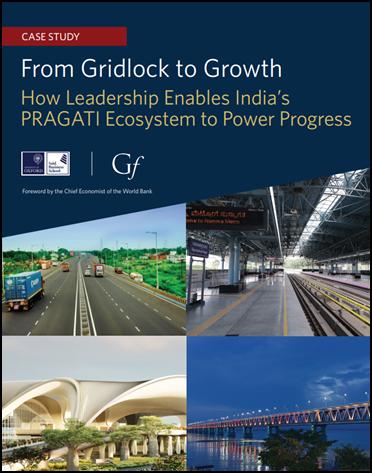 A groundbreaking case study by Oxford’s Saïd Business School, supported by the Gates Foundation, titled ‘From Gridlock to Growth: How Leadership Enables India’s PRAGATI Ecosystem to Power Progress’, has spotlighted PRAGATI (Pro-Active Governance and Timely Implementation) as a game-changer in India’s digital governance landscape. The study reveals that this innovative platform has helped accelerate over 340 critical projects worth $205 billion since its inception in March 2015, underscoring its pivotal role in fast-tracking infrastructure and social development initiatives across the country.
A groundbreaking case study by Oxford’s Saïd Business School, supported by the Gates Foundation, titled ‘From Gridlock to Growth: How Leadership Enables India’s PRAGATI Ecosystem to Power Progress’, has spotlighted PRAGATI (Pro-Active Governance and Timely Implementation) as a game-changer in India’s digital governance landscape. The study reveals that this innovative platform has helped accelerate over 340 critical projects worth $205 billion since its inception in March 2015, underscoring its pivotal role in fast-tracking infrastructure and social development initiatives across the country.
This impact highlights how PRAGATI’s innovative approach has bridged gaps in governance through technology-driven collaboration. By integrating digital data management, video-conferencing, and geo-spatial mapping, it enables seamless collaboration between the Prime Minister’s Office, Central Ministries, and State Governments. This direct engagement ensures that issues are addressed in real time, with the Prime Minister personally reviewing progress and removing roadblocks. Such a holistic approach has created a culture of accountability and efficiency, making PRAGATI a model of cooperative federalism and innovative governance.
Designed to integrate key stakeholders and provide up-to-date visuals of ground-level realities, PRAGATI empowers the Prime Minister to monitor, review, and resolve issues with unprecedented efficiency. The platform’s approach to streamlining governance has not only revolutionised decision-making but also strengthened India’s commitment to e-governance and good governance, as highlighted in the study.
Salient Features of PRAGATI
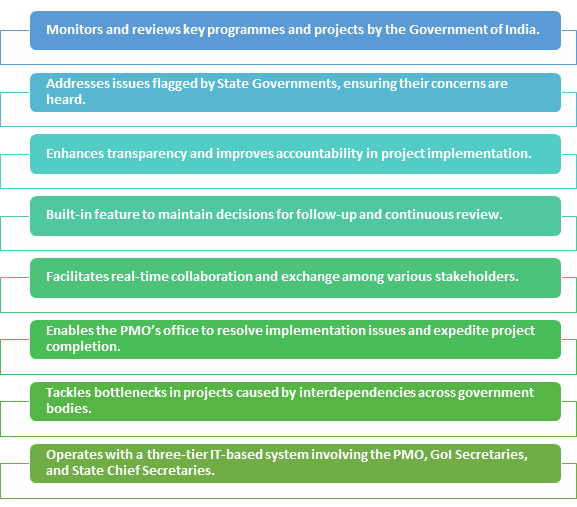
Case Study Findings
Since its inception in 2015, PRAGATI has been a catalyst in transforming India’s infrastructure and social sector development. Through active leadership, strategic project selection, and a robust digital governance framework, the platform has addressed complex challenges across various high-priority projects. The case study explores how PRAGATI has accelerated progress in infrastructure development, resolved roadblocks, fostered collaboration across states, and supported key social initiatives, driving significant improvements in the nation’s development trajectory.
Here are the key findings:
Accelerating Infrastructure Development
Since its launch in 2015, PRAGATI has emerged as a powerful tool for transforming India’s infrastructure landscape. By June 2023, the platform had reviewed 340 projects valued at ₹17.05 lakh crore ($205 billion), significantly expediting their implementation. This includes the development of 50,000 kilometres of National Highways and doubling the country’s airports, reflecting a decade of unparalleled progress.
The selection of these 340 projects was highly strategic, focusing on initiatives of national importance that presented unique and complex challenges. PRAGATI has been instrumental in addressing these ‘wicked’ projects, often considered the most daunting in terms of execution.
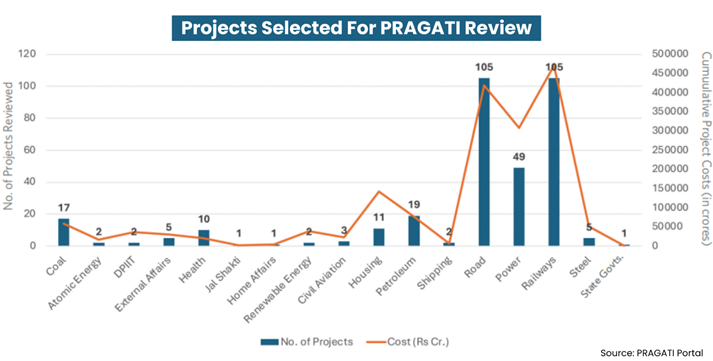
While PRAGATI’s scope encompasses diverse infrastructure types, a significant portion of its focus has been on roads, railways, and power plants – foundational elements of economic growth. This targeted intervention resolves bottlenecks and maximises economic returns, with studies by the Reserve Bank of India and the National Institute of Public Finance and Policy indicating a GDP gain of ₹2.5 to ₹3.5 for every rupee invested in infrastructure.
Leadership from the Top
The Prime Minister’s active involvement has driven PRAGATI’s success, ensuring momentum for 340 critical infrastructure projects. By directly reviewing progress, setting deadlines, and breaking bureaucratic bottlenecks, his leadership has revived numerous stalled initiatives and created a culture of accountability. For instance, the Pakri-Barwadih Coal Mine in Jharkhand, delayed since 2006, saw swift progress after PM Modi’s intervention in 2016, leading to its completion in 2019.
This hands-on approach includes streamlining processes to overcome inefficiencies. In 2017, the Prime Minister directed the Ministry of Railways to address delays in project approvals, resulting in creating an electronic drawing approval system in 2020. This innovation drastically reduced approval timelines, boosting efficiency across ministries.
Collaboration has also been central to PRAGATI’s impact. For the Ennore-Thiruvallur-Bengaluru Gas Pipeline, which faced land issues across three states, the Prime Minister urged creating a single implementing agency to resolve disputes. This decisive action ensured the project’s completion in January 2024, exemplifying PRAGATI’s role as a catalyst for coordination and timely execution.
Driving Accountability and Resolving Roadblocks
PRAGATI instils a sense of urgency in officials, prompting proactive problem-solving even before projects are reviewed. The looming possibility of inclusion in the Prime Minister’s monthly review often motivates stakeholders to address delays. For instance, in the five months leading to its PRAGATI review, the National Broadband Mission secured half of its pending right-of-way permissions from diverse authorities, expediting its goal of universal internet access.
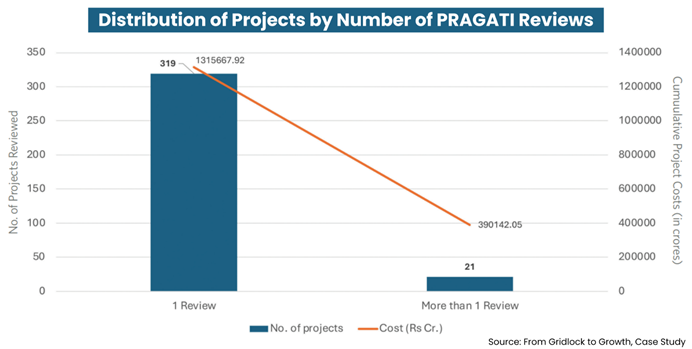
The platform fosters cooperation among stakeholders, often overcoming long-standing disputes. The expansion of the Dahisar-Surat segment of NH 48, stalled due to environmental approvals, saw resolution after its inclusion in PRAGATI in 2017. The National Wildlife Board delegated decision-making to Maharashtra’s state board, which approved the project while ensuring measures to protect wildlife, breaking a years-long impasse.
PRAGATI also grants stakeholders the authority to resolve entrenched issues. In the case of the Haridaspur-Paradeep Rail Link, PRAGATI empowered the Ministry of Shipping to dilute contentious investors in its financing structure, unlocking progress. Even the mere prospect of PRAGATI scrutiny encourages swift action, with stakeholders keen to avoid appearing on the platform for unresolved challenges.
Digital Governance Ecosystem
The study highlights India’s remarkable digital transformation, showcasing how platforms like PRAGATI, PM Gati Shakti, PARIVESH, and the Project Monitoring Group (PMG) portal have revolutionised governance and infrastructure development. PRAGATI integrates tools such as video conferencing, drone feeds, and centralized data systems to streamline project monitoring and execution. This is exemplified by the Dahisar-Surat highway project, where GPS tracking optimized resource utilization and minimized delays.
PARIVESH has significantly accelerated environmental and forest clearance processes, reducing timelines from 600 days to as few as 70-75 days, with forest clearances now requiring just 20-29 days for central approvals. Its automation and digitized workflows ensure transparency, efficiency, and adherence to environmental compliance. PM Gati Shakti enhances inter-ministerial coordination using a centralized portal and geospatial tools, enabling sustainable project planning, as demonstrated by route adjustments for the Pune-Bengaluru Expressway, which mitigated environmental impact and reduced costs.
The PMG portal consolidates data across platforms, creating a unified system for infrastructure project tracking and integrating AI for predictive monitoring. Together, these platforms form an integrated digital governance ecosystem, accelerating development, fostering collaboration, and driving the modernization of India’s infrastructure sector.
PRAGATI in the Social Sector
PRAGATI has been instrumental in accelerating social sector schemes, significantly improving the lives of millions of Indians. By bringing key programs under the Prime Minister’s purview, the platform has enhanced coordination and expedited service delivery, driving improvements in living standards, connectivity, and essential services.
A prime example is the Jal Jeevan Mission, which aims to provide tap water connections to every rural household by 2024. PRAGATI reviews have facilitated faster progress, raising the percentage of rural households with running water from 17% in 2019 to 74% in 2024. Similarly, the Swachh Bharat Mission has successfully installed over 100 million toilets, contributing to improved sanitation and public health by curbing open defecation and groundwater contamination. Additionally, the Saubhagya Scheme provides free electricity to rural households and has made significant strides toward universal electrification with PRAGATI’s oversight.
Beyond these initiatives, PRAGATI meetings also focus on the efficiency of government services. For instance, after repeated grievances regarding delays in passport issuance, the Ministry of External Affairs, under PRAGATI’s scrutiny, implemented reforms that reduced processing times from 16 days to 7 days. Such high-level oversight has led to systemic improvements in government services, enhancing overall responsiveness and effectiveness.
Collaboration Across States
Since its inception in 2015, PRAGATI has fostered collaboration across states, embodying the concept of “Team India” – a unified approach to national development that transcends political divides. The platform’s video conferencing feature has revolutionized centre-state interactions, providing a neutral space where development goals precede political differences. Bringing together the Prime Minister, central ministry secretaries, and state chief secretaries on a single platform, PRAGATI facilitates direct communication, enabling swift resolution of inter-state and centre-state issues while breaking down traditional bureaucratic silos.
PRAGATI also aligns central ministries, creating a cohesive approach to governance. PRAGATI ensures that decisions are visible to all relevant stakeholders by enabling transparency across departments. This shared visibility and data-sharing minimize delays and prevent projects from getting stuck in bureaucratic bottlenecks, ensuring that development continues smoothly and efficiently.
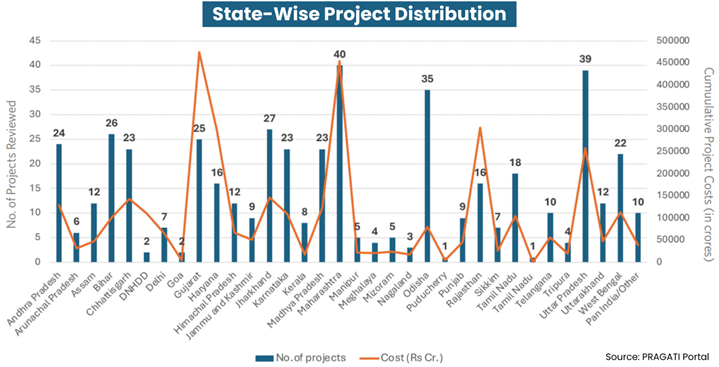
Digital Governance Lessons for Global Leaders
PRAGATI offers valuable lessons for global leaders looking to transform infrastructure development in their countries. By adopting regular accountability reviews, fostering inclusive collaborative frameworks, and ensuring broad participation in decision-making, nations can enhance efficiency and achieve greater success in their development goals. Leveraging technology for better coordination, as PRAGATI does with its digital platforms, enables countries to streamline processes and improve project delivery.
These lessons are particularly relevant for developing nations seeking to make infrastructure a key driver of economic growth. While the transition to such systems may require initial investments and cultural shifts, the long-term benefits of more reliable infrastructure and increased public trust will far outweigh the costs. By following PRAGATI’s example, countries can build a stronger, more sustainable development foundation.
Conclusion
In conclusion, the case study by Oxford’s Saïd Business School, supported by the Gates Foundation, highlights PRAGATI as a transformative model for digital governance, showcasing its effectiveness in accelerating infrastructure and social development projects. By integrating technology, fostering collaboration, and ensuring accountability, PRAGATI has played a pivotal role in overcoming bureaucratic hurdles and driving national development. The insights drawn from this case study provide valuable lessons for global leaders, particularly in developing nations, on how to leverage digital tools for more efficient governance and sustainable growth. PRAGATI’s success exemplifies the power of a unified approach to governance, offering a blueprint for other countries to follow in achieving their development goals.
References: